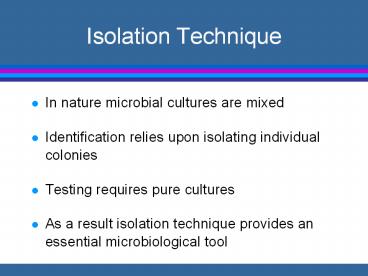Isolation Technique - PowerPoint PPT Presentation
1 / 20
Title:
Isolation Technique
Description:
Isolation Technique In nature microbial cultures are mixed Identification relies upon isolating individual colonies Testing requires pure cultures – PowerPoint PPT presentation
Number of Views:252
Avg rating:3.0/5.0
Title: Isolation Technique
1
Isolation Technique
- In nature microbial cultures are mixed
- Identification relies upon isolating individual
colonies - Testing requires pure cultures
- As a result isolation technique provides an
essential microbiological tool
2
Mixed Culture from Raw Poultry
3
Streak Plate Isolation Principle
- An original inoculum containing a mixture of
bacteria is spread into 4 quadrants on solid
media. - The goal is to reduce the number of bacteria in
each subsequent quadrant. - Colonies are masses of offspring from an
individual cell therefore streaking attempts to
separate individual cells. - Discrete colonies form as the individual cells
are separated and then multiply to form isolated
colonies in the later quadrants.
4
The Goal -Isolated Colonies to Start Pure
Cultures
5
Can an isolated colony be considered pure?
- This is generally assumed, however.
- some colonies are very slow growers and may be
too small to see. - some colonies may be growing under another colony
- selective media may be preventing reproduction of
some bacteria so they may be present but not
visible - condensed water, capsules, slime, all represent
areas where individual contaminant cells hide out.
6
Any special considerations?
- Different species of microbes represent
challenges. - Encapsulated bacteria are sticky and dont
separate well. - Some species are motile and do not stay where you
streak them spreading across the plate. - Fungal spores easily contaminate cultures within
a plate. - Organisms can gain entrance to a Petri dish
through water or the edges, or from the air
currents while you are streaking.
7
Microbes will surprise you each chance they get !
8
Isolation Requires Aseptic Technique
9
Isolation Requires Aseptic Technique
- Aseptic technique is the process of
- Preventing contamination of a culture with
environmental microbes - Preventing contamination of yourself or the
environment with the organism in the culture - Remember everything is contaminated with a
variety of environmental microbes. - Remember microbes are invisible, you must see
with your minds eye during these procedures.
10
Streaking the Quadrants
11
Quadrant 1- Streak with broad narrow strokes in
the upper half of the first quarter of the plate.
12
Incinerate and cool the loop between the quadrants
13
Quadrant 2 Rotate the plate, enter the previous
streak mark one or two times and then streak the
upper portion of the second quarter of the plate
with broad strokes.
14
Incinerate and cool the loop between the quadrants
15
Quadrant 3 Rotate the plate, enter quadrant 2
one or two times and then streak with shorter
more separated strokes from the top of the
quadrant to the center.
16
Incinerate and cool the loop between the quadrants
17
Quadrant 4 Enter quadrant 3 and then streak
with broad S-shaped motions through the center of
the plate.
18
Streaking the Quadrants
19
Isolated Colonies
20
Gram Stain

